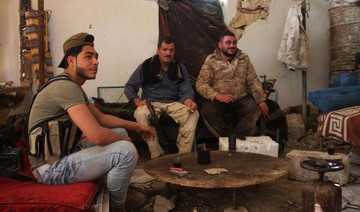AMMAN, Jordan: Russia launched its first airstrikes in four days in the southern Syrian region of Daraa on Wednesday after talks aimed at restoring the Assad regime rule collapsed.
The airstrikes targeted Tafas, northwest of the provincial capital Daraa, and Saida to the east. Barrel bombs were also dropped on Saida.
Regime forces backed by Russian air power launched an offensive last month to recapture the region from opposition groups led by the Free Syrian Army, and have seized a large chunk of their territory.
Opposition delegates had been negotiating with Russia since Saturday to end fighting by accepting the return of state sovereignty, but they failed to agree. The talks collapsed because the Russians insisted that opposition forces hand over all their heavy weapons immediately and unconditionally, Free Syrian Army spokesman Abu Shaima said.
Arab News obtained a copy of the 13-point opposition plan rejected by Russian negotiators. In it, the Free Syrian Army offers to surrender its heavy weapons immediately on condition of international or Arab guarantees to any deal, and the simultaneous release of half the prisoners held by the Assad regime.
It also demands the right of all displaced Syrians to return to their homes without any restrictions or punishment. Other issues to be resolved were the status of former Syrian army officers, and the right of Free Syrian Army fighters in Daraa to join the remaining opposition forces in the northwestern province of Idlib.
The opposition also suggested Jordan could guarantee the agreement, but sources in Amman said this was unlikely.
“Jordan is keen on the stability of south Syria and will do everything it can to make a peaceful resolution work, but it is unlikely that Jordanian troops will be deployed to guarantee any agreement,” Naser Tahboub, chairman of the international development department at the University of Jordan, told Arab News.
Jordan’s Foreign Minister Ayman Safadi held talks in Moscow on Wednesday with Russian Foreign Minister Sergei Lavrov, and said a humanitarian catastrophe risked unfolding in southern Syria if there were no cease-fire.
Jordan was working to find a political solution that can “guarantee the security of Syrians and their dignity in their own country,” he said.
Lavrov said Syria would be discussed at the coming summit meeting between US President Donald Trump and Russian President Vladimir Putin.



























